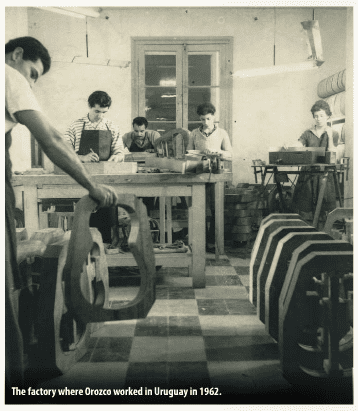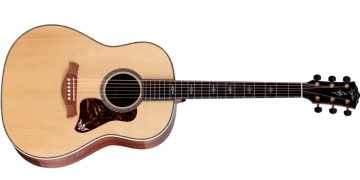 Juan Orozco has been developing and manufacturing strings since the late 1960s, but his guitar education, both as a player and a luthier, began a lot earlier. Orozco started not only playing flamenco guitar, but also working on guitars with his father at the ripe age of seven. The two of them left Spain in 1950 and headed to Sao Paolo, Brazil. There, Orozco continued to work alongside his father. From Brazil, Orozco traveled to Uruguay in 1956 to continue his studies of the classical guitar with Abel Caldevaro, a Uruguayan classical guitar composer and teacher, and Atilio Rapat, a Uruguayan musician who is considered by many to be a true master of the instrument. Four years later, Juan made the decision to stop working for his father, but stayed in South America. He decided to go solo and started working out of a small industrial building, paying $1,200 a month in rent.
Juan Orozco has been developing and manufacturing strings since the late 1960s, but his guitar education, both as a player and a luthier, began a lot earlier. Orozco started not only playing flamenco guitar, but also working on guitars with his father at the ripe age of seven. The two of them left Spain in 1950 and headed to Sao Paolo, Brazil. There, Orozco continued to work alongside his father. From Brazil, Orozco traveled to Uruguay in 1956 to continue his studies of the classical guitar with Abel Caldevaro, a Uruguayan classical guitar composer and teacher, and Atilio Rapat, a Uruguayan musician who is considered by many to be a true master of the instrument. Four years later, Juan made the decision to stop working for his father, but stayed in South America. He decided to go solo and started working out of a small industrial building, paying $1,200 a month in rent.
 By the early 1960s, specifically 1963, things in South America started to become complicated. The military took an increasingly larger and larger involvement in not only civilian life, but also the very structure of the government. Orozco traveled to the United States in 1964 to stay. In October of that year, Orozco met the Los Índios Tabajaras, a guitar duo of two brothers from the Northeast region of Brazil. With the money he had amassed from building guitars, Orozco was able to finally start his own business – the Aranjuez Strings we know today. This was a decision Orozco made after hearing complaints from musicians about the imperfections of string brands already on the market, specifically in regards to tone and intonation.
By the early 1960s, specifically 1963, things in South America started to become complicated. The military took an increasingly larger and larger involvement in not only civilian life, but also the very structure of the government. Orozco traveled to the United States in 1964 to stay. In October of that year, Orozco met the Los Índios Tabajaras, a guitar duo of two brothers from the Northeast region of Brazil. With the money he had amassed from building guitars, Orozco was able to finally start his own business – the Aranjuez Strings we know today. This was a decision Orozco made after hearing complaints from musicians about the imperfections of string brands already on the market, specifically in regards to tone and intonation.
There are tons of manufacturers creating guitar strings in the market, but Juan Orozco doesn’t worry about them and just focuses on his own product. “In the market today, there are very good strings,” he says. “Aranjuez has always stood by our brilliant sound. We specialize in classical guitar and we just try to make the best sound you can give the instrument… [We] try to make each string provide the tone that suits you.” When he first started trying out guitar strings of competitors, he noticed they lacked brightness and color, something he knew he could restore. After a few years and multiple tries, Orozco was onto something. “In the research process, I could decipher the string represents 50 percent of the good sound of a good guitar. A good guitar with a malformed string results in lost sound. After two years, many experiments, and collaboration with guitarists like Alfredo Gil, Los Panchos, Rey de la Torre, Narciso Yepes, and Celedonio Romero and Sons, our strings were selling worldwide.”
Years later, Orozco would organize a concert series that not only established up-and-coming musicians, but the concerts also allowed him to keep in touch with those musicians and ask them for feedback. “There was never commitment to having to use only and exclusively Aranjuez strings. Artists who emerged from this series include Manuel Barrueco, Edward Monge, and Manolo San Lucas, among others. Manuel Barrueco serves as an example that I did not restrict guitarists to the exclusive use of Aranjuez strings… The only ones who gave me unconditional support were Carlos Montoya, Celedonio Romero and sons, Narciso Yepes, [among others].”
One of Juan’s main priorities in those early days of Aranjuez Strings has carried over to now: the production of a new monofilament. “In 1980, the house Dupont visited me asking for a collaboration to develop a new monofilament for guitar,” he said. “We developed a product called ‘Dimetrol,’ – I called Narciso Yepes to participate in this collaboration with me. That Dupont nylon was manufactured until 1994. He stopped producing it because there were only two brands, including Aranjuez, who felt the quality was worth the high cost of the material.” After production shut down for Dupont nylon, Orozco still desired quality strings made from quality materials. “This is our next project,” he says, “trying to produce other materials, which give us a better sound.”
It’s clear that Juan Orozco’s father’s dedication and love for guitar making carried over to his son. It’s in his blood. The next few years for Aranjuez, and for Orozco, will include celebrations, new product releases, and of course product development. “We are celebrating this year the 50th anniversary of Juan Orozco Corporation and waiting three more years to celebrate 50 years of Aranjuez Strings,” says Orozco. “We again start with The New Talent Guitar Guitar Strings series, presented by Aranjuez.” When asked what Orozco still hopes to achieve with Aranjuez, he answers, “I will concentrate on trying to produce our own metals and trying to develop the new monofilament.”


























